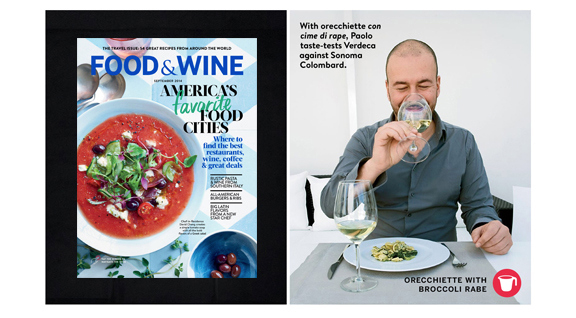 Above: Neramaro grapes ready for harvest in Salento, Puglia. Would anyone really be hurt if the name were changed? There’s no doubt that fewer people would be offended if it were modified or a suitable alternative were available.
Above: Neramaro grapes ready for harvest in Salento, Puglia. Would anyone really be hurt if the name were changed? There’s no doubt that fewer people would be offended if it were modified or a suitable alternative were available.
The more closely you look at a word, wrote the early 20th-century aphorist Karl Kraus, the more distantly it looks back at you.
This nugget of wisdom couldn’t be more true when it comes to the name of one of Puglia’s most important grape varieties, Negroamaro.
While no one knows its origins for certain, some ampelographers believe that the name is what linguists call a hybrid tautology. In antiquity, it wasn’t uncommon for cities, for example, to be named twice, with part of the name in Latin and part in Greek. The most famous instance of this is the Sicilian town of Linguaglossa, from the Latin lingua (tongue or language) and the Greek γλῶσσα (transliterated glossa, tongue or language). There are a number of cities in Sicily that still have toponyms like this. Scholars suppose that this helped to mitigate confusion among anicent travelers who may have been familiar with one language but not the other.
In the case of the grape name, it’s possible that it comes from the Latin niger (black) and the Greek μαῦρος (transliterated mavros, meaning black). Even today, red grape varieties and red wines are sometimes referred to as “black” in romance languages. Pinot Noir, Nero d’Avola, and Nerello are examples of this. The Latin name in this case, according to the theory, is followed by a corruption of the Greek.
Others take the meaning of the ampelonym at face value. They believe the name means bitter black, from the Italian negro (an archaic form of the modern-day Italian nero) and the Italian amaro, meaning bitter or sour. As evidence of this theory, they point to the popular Greek grape variety Ξινόμαυρο (transliterated Xinomavro) from the Greek ξινό (transliterated xinó) meaning bitter or sour and μαῦρος (mavros) meaning black (as above).
In antiquity grapes were mostly vinified as sweet wines, with high residual sugar. It’s plausible that as tastes began to shift to drier wines in the late 19th and early 20th centuries, a grape name like bitter black may have been an indication of the variety’s flavor when vinified in an unsweet style.
Whether “bitter black” or “black black” the ampelonym’s semantic evolution took an unexpected turn when Negroamaro began to become popular among Italian wine lovers in the U.S.
In the late 1990s and early 2000s, American wine influencers, including media and wine trade members, began to shift their focus from international grape varieties to highly localized varieties. It was only natural that interest in grapes like Negroamaro, which is grown nearly exclusively in Puglia’s Salento peninsula, would expand. And that’s exactly what happened. This once little-known variety, which produces value-driven high-quality wine, is now a favorite of sommeliers. They love it because the grape’s classic meaty character and its vibrant acidity make it a favorite of California Cabernet Sauvignon lovers.
With this heightened interest, an unfortunate linguistic impropriety also emerged. And it’s had a substantively undesirable impact on the way the grape variety and the people who grow it are perceived.
Understandably, the name of the grape is highly offensive to Black wine enthusiasts.
It’s important to note that negro in this case is what linguists call a “false friend”: To someone not familiar with romance languages, it sounds like a racist slur.
But there’s absolutely no way to mitigate the grape name’s injuriousness.
It was October 2017 when my close friend and longtime client Paolo Cantele presented his family’s wines at a wine dinner in Houston where I live. Roughly half the guests were Black. I’ll never forget the look I got when I presented the wine to two Black couples sitting together at the same table. When I mentioned the grape name, one of the women looked up at me in disbelief. What was that I heard you just say? she noted incredulously. I apologized and gently told her that the grape name came from the Latin word for black. She seemed satisfied with my response and I believe it was abundantly clear to everyone at the table that I wasn’t using a racial slur. But there was no avoiding the unspoken, however unintended, offense that had taken place. To this day, I feel terrible about that episode.
“When I present our wines in the U.S.,” Paolo told me later, I use Neramaro” instead of the historic ampelonym. His neologism, he said, was his own invention. It’s not an officially recognized designation, nor is it in common use among Pugliese producers. To my knowledge, he’s the only person who uses it — besides me.
Some of my fellow wine professionals will counter that the grape name is part of a viticultural tradition that would be diminished by a “politically correct” name change. Why, they might ask, should Salento growers be forced to “give in” to a cultural trend that has nothing to do with Salento winemaking? My answer to them is that we’ve reached a tipping point where it has become socially irresponsible and morally reprehensible to ignore the impact that the name has on an entire demographic — not just in the U.S. but in Europe as well.
There have been numerous cases in Italian wine where appellations have changed the names of grapes, although not for socially sensitive reasons.
Prosecco was changed to Glera in the hope that it would elevate the wine’s brand recognition (the jury’s still out on whether it has or not). Tocai Friulano was changed to Friulano after the EU ruled in favor of Tokay producers who claimed trademark infringement (sales grew in the wake of the change). Vino Nobile di Montepulciano was changed to Nobile in the hope that it would help Americans with pronunciation (it didn’t).
If Europeans can be compelled to change a grape name for commercial and juridical reasons, how can we ignore the negative fallout that our now-in-vogue Salento variety has had consumers, trade members, and influencers who are deeply and rightly aggrieved by its name?
It’s not a “fault” that the West’s viticultural tradition has produced a grape name that encroaches on the dignity of countless wine lovers. But it is our shortcoming that we have failed to take action to remedy this aberration.
The farther back we look at a word, the more closely it looks back at us. As we look forward toward the future of Italian wine in the U.S., we need to muster the moral strength and civic courage to make these excellent wines palatable to all gradations of humanity — and not just our own.
 As the U.S. begins to open up again, times couldn’t be more exciting for the wine industry. People — trade members and consumers alike — are all eager to taste after more than a year of lockdown.
As the U.S. begins to open up again, times couldn’t be more exciting for the wine industry. People — trade members and consumers alike — are all eager to taste after more than a year of lockdown.



















